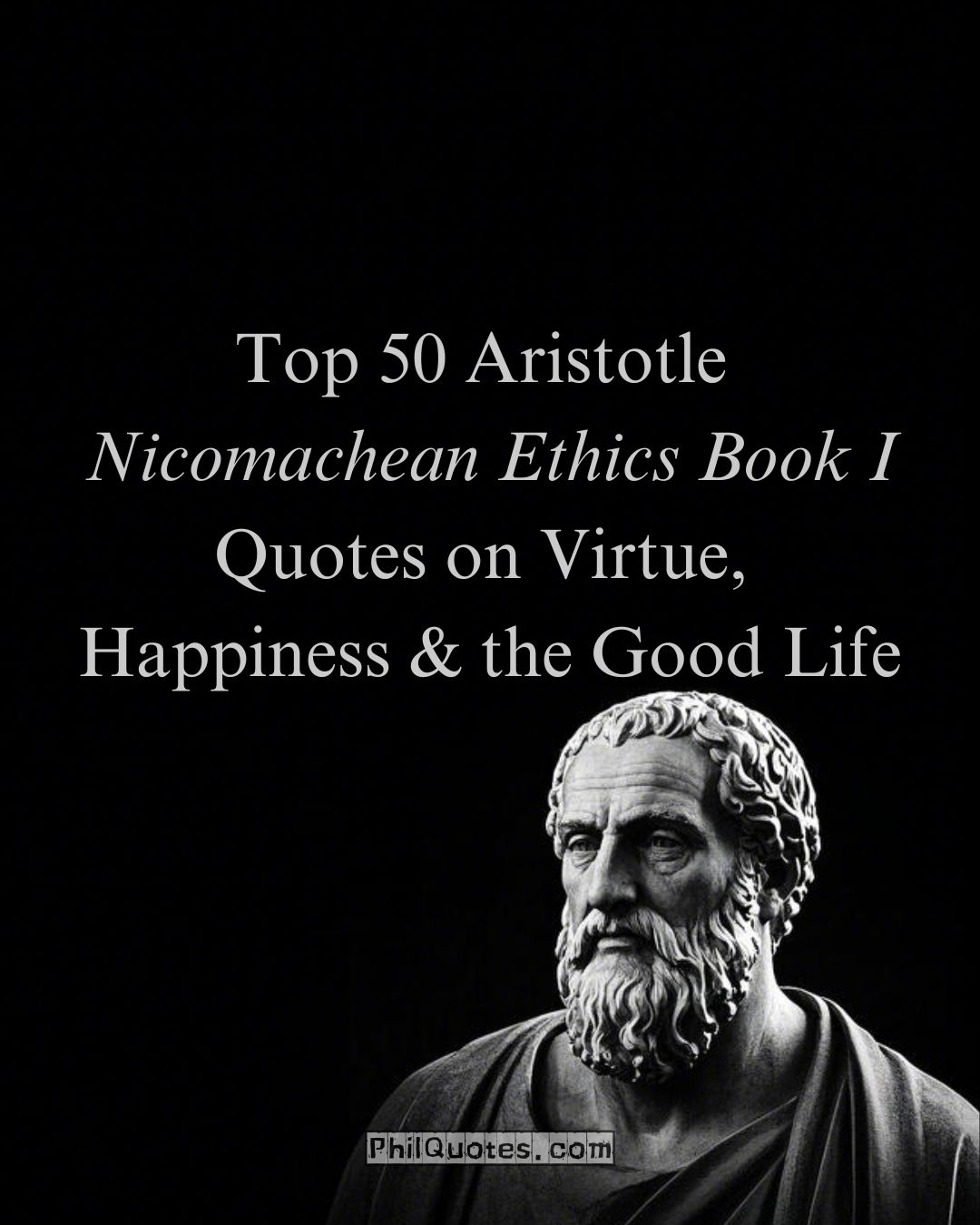
At PhilQuotes.com, we uncover philosophy’s timeless wisdom through curated insights from history’s greatest thinkers. In this definitive guide, we present 50 essential quotes from Aristotle’s Nicomachean Ethics, Book I—a foundational text on moral philosophy. From the pursuit of the “highest good” to the interplay of virtue and politics, these quotes, handpicked by PhilQuotes.com, dissect Aristotle’s vision of human flourishing. Each quote is accompanied by an image; click on the quote to view its corresponding image, bridging ancient philosophy with modern life. Whether you’re a student of ethics or a seeker of wisdom, let PhilQuotes.com guide your journey through Aristotle’s masterwork.
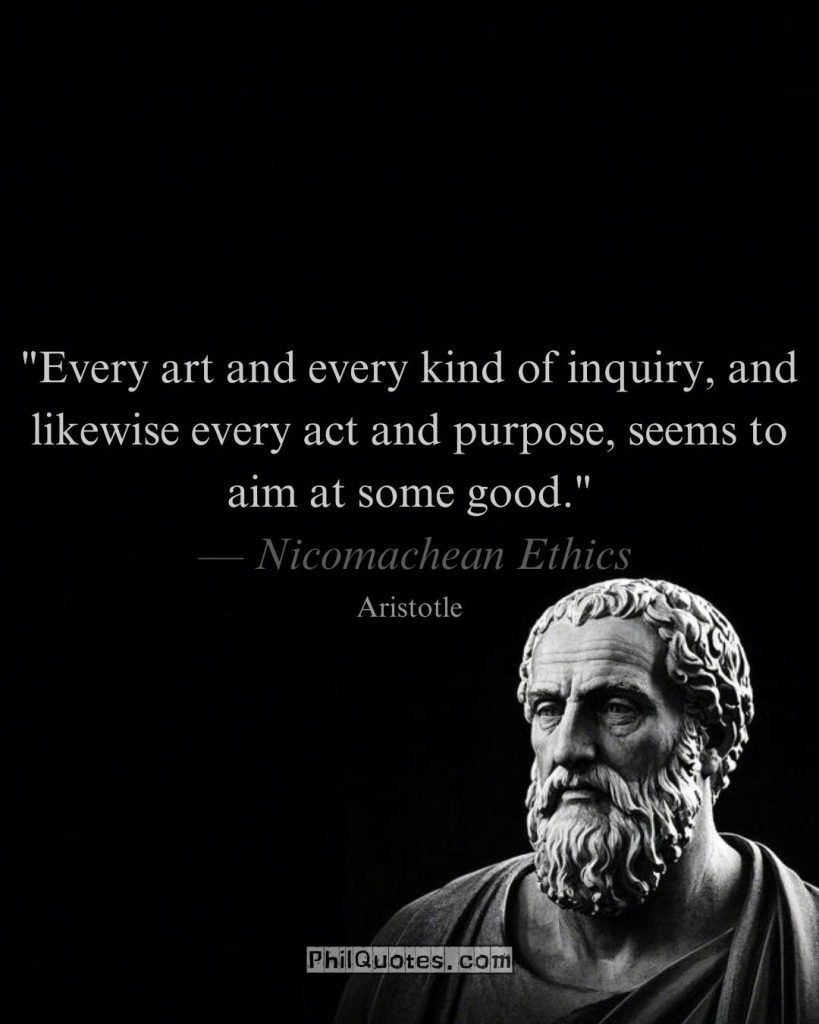
- “Every art and every kind of inquiry, and likewise every act and purpose, seems to aim at some good.”
— Aristotle, Nicomachean Ethics, Book I, Chapter 1
(Translated by W.D. Ross)
- “The good has rightly been declared to be that at which all things aim.”
— Aristotle, Nicomachean Ethics, Book I, Chapter 1
(Translated by W.D. Ross)
- “Happiness is something final and self-sufficient, and is the end of action.”
— Aristotle, Nicomachean Ethics, Book I, Chapter 7
(Translated by W.D. Ross)
- “The function of man is an activity of soul which follows or implies a rational principle.”
— Aristotle, Nicomachean Ethics, Book I, Chapter 7
(Translated by W.D. Ross)
- “One swallow does not make a spring, nor does one day; and so too one day, or a short time, does not make a man blessed and happy.”
— Aristotle, Nicomachean Ethics, Book I, Chapter 7
(Translated by W.D. Ross)

- “The end of the master-art is always more desired than the ends of the subordinate arts.”
— Aristotle, Nicomachean Ethics, Book I, Chapter 1
(Translated by W.D. Ross)
- “Politics appears to be the science which best deserves the name of master-science.”
— Aristotle, Nicomachean Ethics, Book I, Chapter 2
(Translated by W.D. Ross)
- “The good of man must be the end of the science of Politics.”
— Aristotle, Nicomachean Ethics, Book I, Chapter 2
(Translated by W.D. Ross)
- “Happiness is the highest of all realizable goods.”
— Aristotle, Nicomachean Ethics, Book I, Chapter 4
(Translated by W.D. Ross)
- “The many do not give the same account of the good as the wise.”
— Aristotle, Nicomachean Ethics, Book I, Chapter 4
(Translated by W.D. Ross)
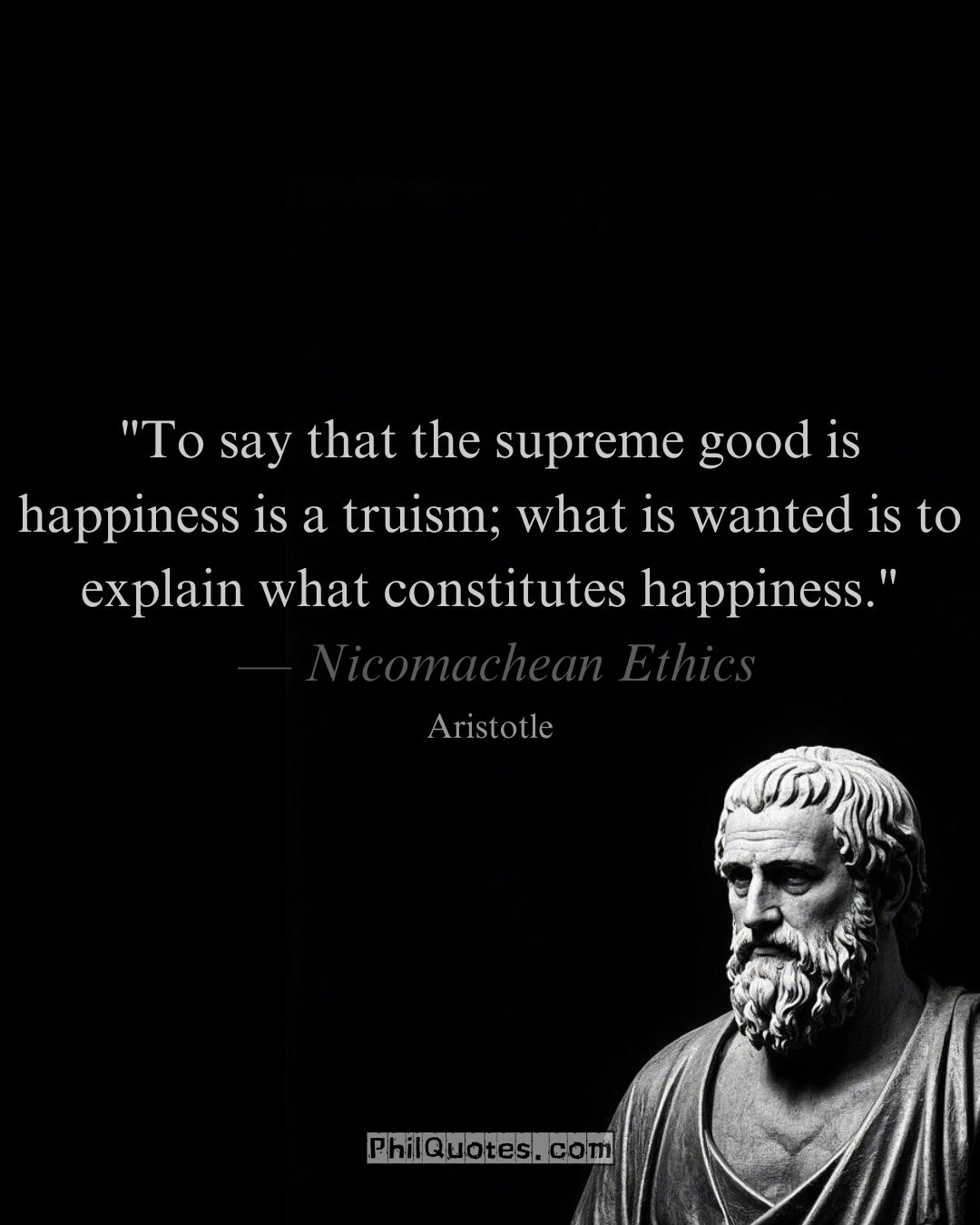
- “To say that the supreme good is happiness is a truism; what is wanted is to explain what constitutes happiness.”
— Aristotle, Nicomachean Ethics, Book I, Chapter 4
(Translated by W.D. Ross)
- “The life of enjoyment is slavish and fit only for beasts.”
— Aristotle, Nicomachean Ethics, Book I, Chapter 5
(Translated by W.D. Ross)
- “Honour is too superficial to be the good we seek; it depends on those who confer it.”
— Aristotle, Nicomachean Ethics, Book I, Chapter 5
(Translated by W.D. Ross)
- “Virtue also is incomplete; for a man may possess it yet be asleep or inactive throughout life.”
— Aristotle, Nicomachean Ethics, Book I, Chapter 5
(Translated by W.D. Ross)
- “Wealth is merely useful for the sake of something else.”
— Aristotle, Nicomachean Ethics, Book I, Chapter 5
(Translated by W.D. Ross)
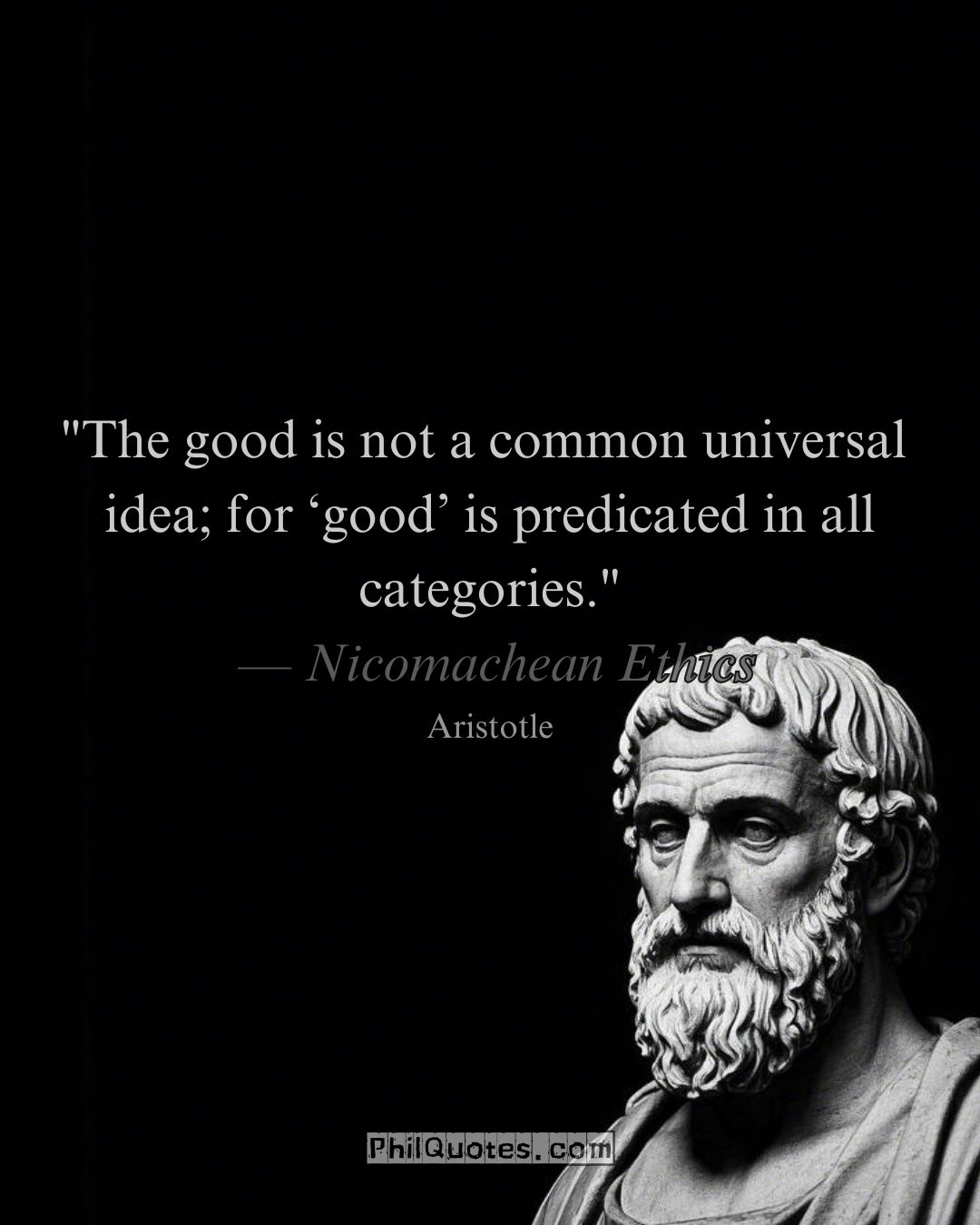
- “The good is not a common universal idea; for ‘good’ is predicated in all categories.”
— Aristotle, Nicomachean Ethics, Book I, Chapter 6
(Translated by W.D. Ross)
- “If there were one common idea of good, there would be one science of all goods; but there are many sciences.”
— Aristotle, Nicomachean Ethics, Book I, Chapter 6
(Translated by W.D. Ross)
- “The Pythagoreans place the One among the goods; perhaps they are right.”
— Aristotle, Nicomachean Ethics, Book I, Chapter 6
(Translated by W.D. Ross)
- “Goods in themselves are those pursued apart from their consequences, such as wisdom and sight.”
— Aristotle, Nicomachean Ethics, Book I, Chapter 6
(Translated by W.D. Ross)
- “The good we are seeking is human good and the happiness of man.”
— Aristotle, Nicomachean Ethics, Book I, Chapter 7
(Translated by W.D. Ross)
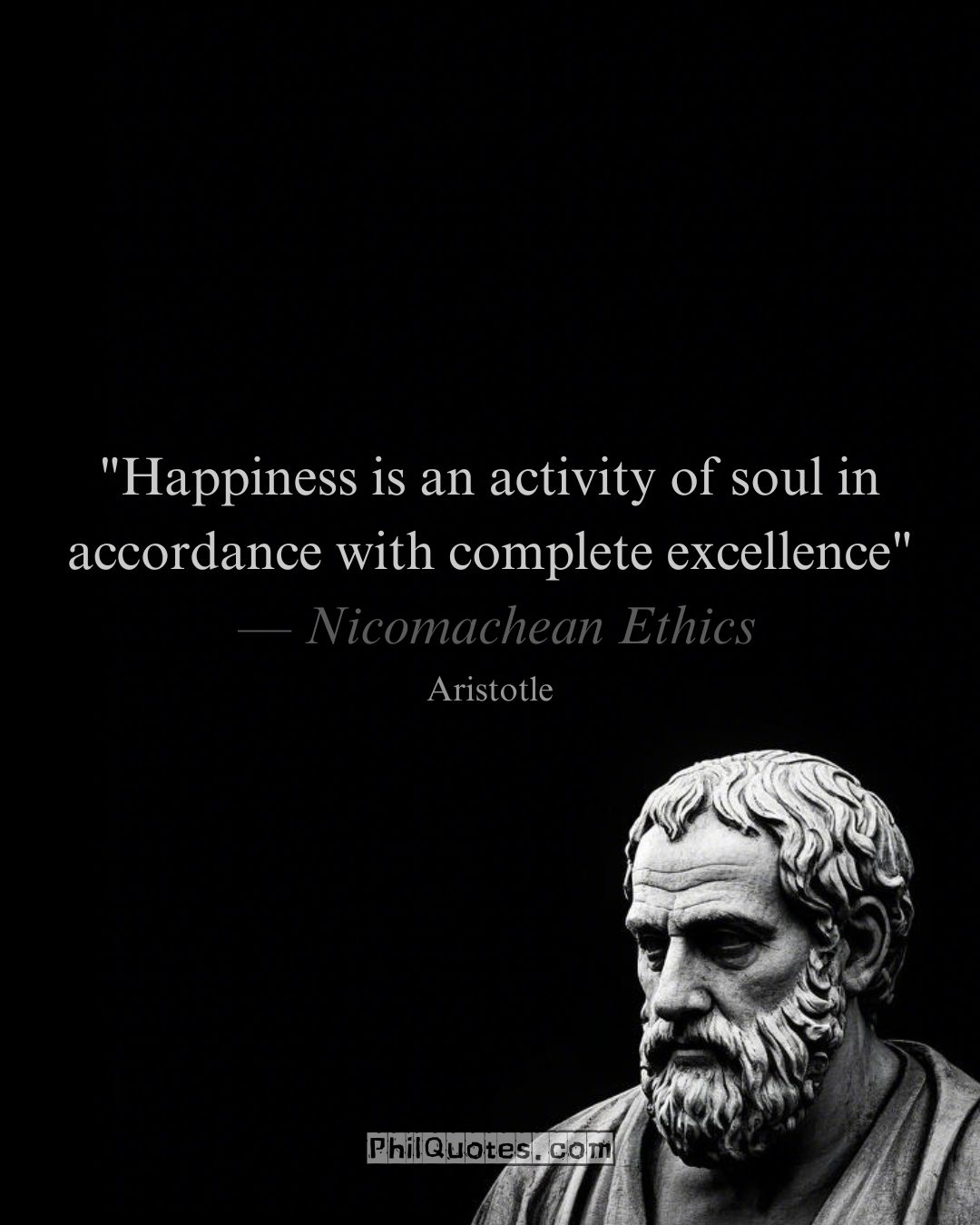
- “Happiness is an activity of soul in accordance with complete excellence.”
— Aristotle, Nicomachean Ethics, Book I, Chapter 7
(Translated by W.D. Ross)
- “The good of man is a working of the soul in accordance with virtue, and if there be more than one virtue, in accordance with the best and most perfect.”
— Aristotle, Nicomachean Ethics, Book I, Chapter 7
(Translated by W.D. Ross)
- “One swallow does not make a spring, nor does one day; so too one day or a short time does not make a man blessed and happy.”
— Aristotle, Nicomachean Ethics, Book I, Chapter 7
(Translated by W.D. Ross)
- “The happy man lives well and does well; for we have practically defined happiness as a sort of good life and good action.”
— Aristotle, Nicomachean Ethics, Book I, Chapter 8
(Translated by W.D. Ross)
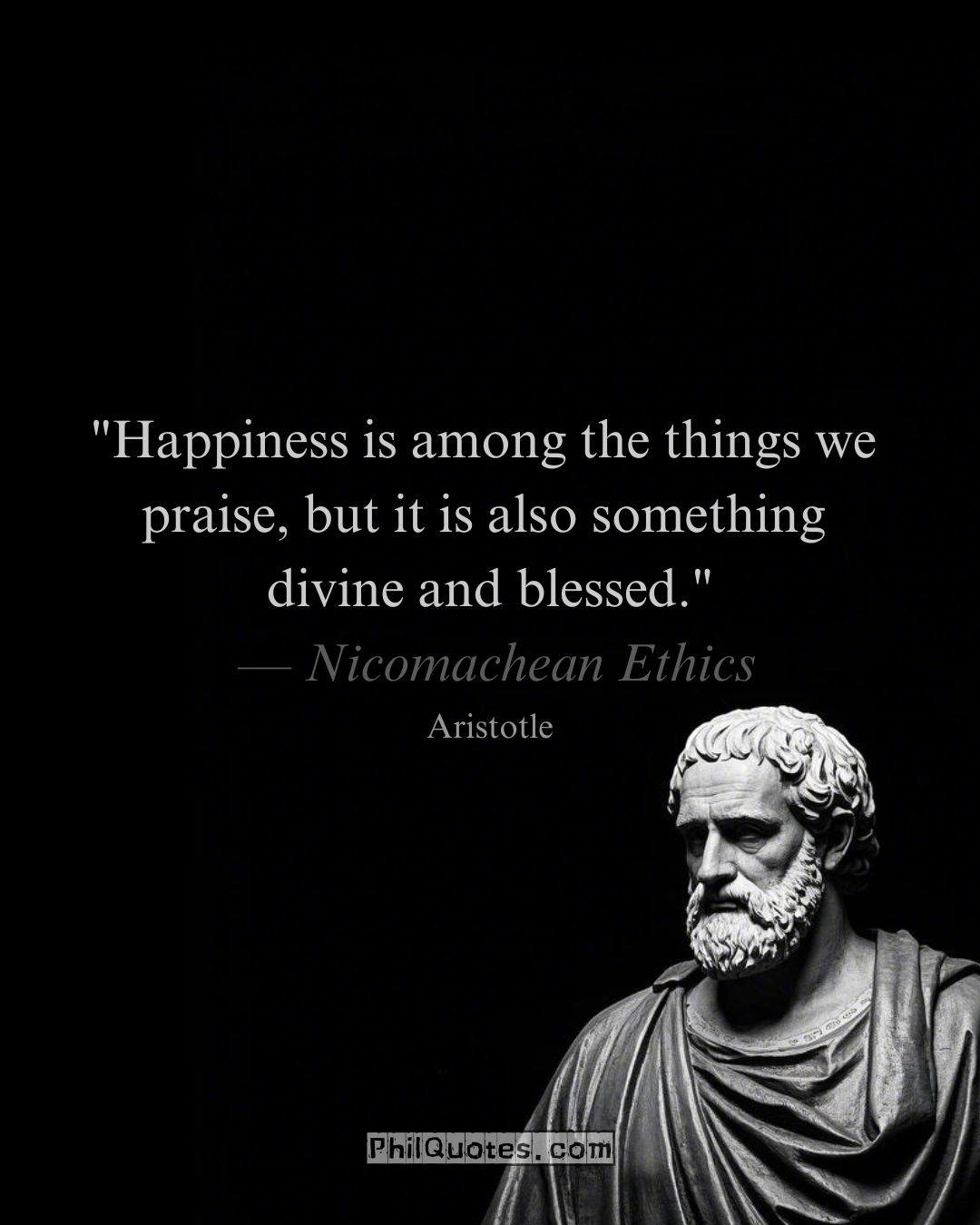
- “Happiness is among the things we praise, but it is also something divine and blessed.”
— Aristotle, Nicomachean Ethics, Book I, Chapter 8
(Translated by W.D. Ross)
- “The happy man will need external prosperity; for it is impossible to do noble deeds without proper equipment.”
— Aristotle, Nicomachean Ethics, Book I, Chapter 8
(Translated by W.D. Ross)
- “Happiness seems to require this sort of prosperity; and hence some identify it with good fortune.”
— Aristotle, Nicomachean Ethics, Book I, Chapter 8
(Translated by W.D. Ross)
- “No one calls a man happy who meets with misfortunes like Priam’s.”
— Aristotle, Nicomachean Ethics, Book I, Chapter 9
(Translated by W.D. Ross)
- “Happiness is a permanent condition; for the happy man will always or at least most frequently act and contemplate virtuously.”
— Aristotle, Nicomachean Ethics, Book I, Chapter 10
(Translated by W.D. Ross)
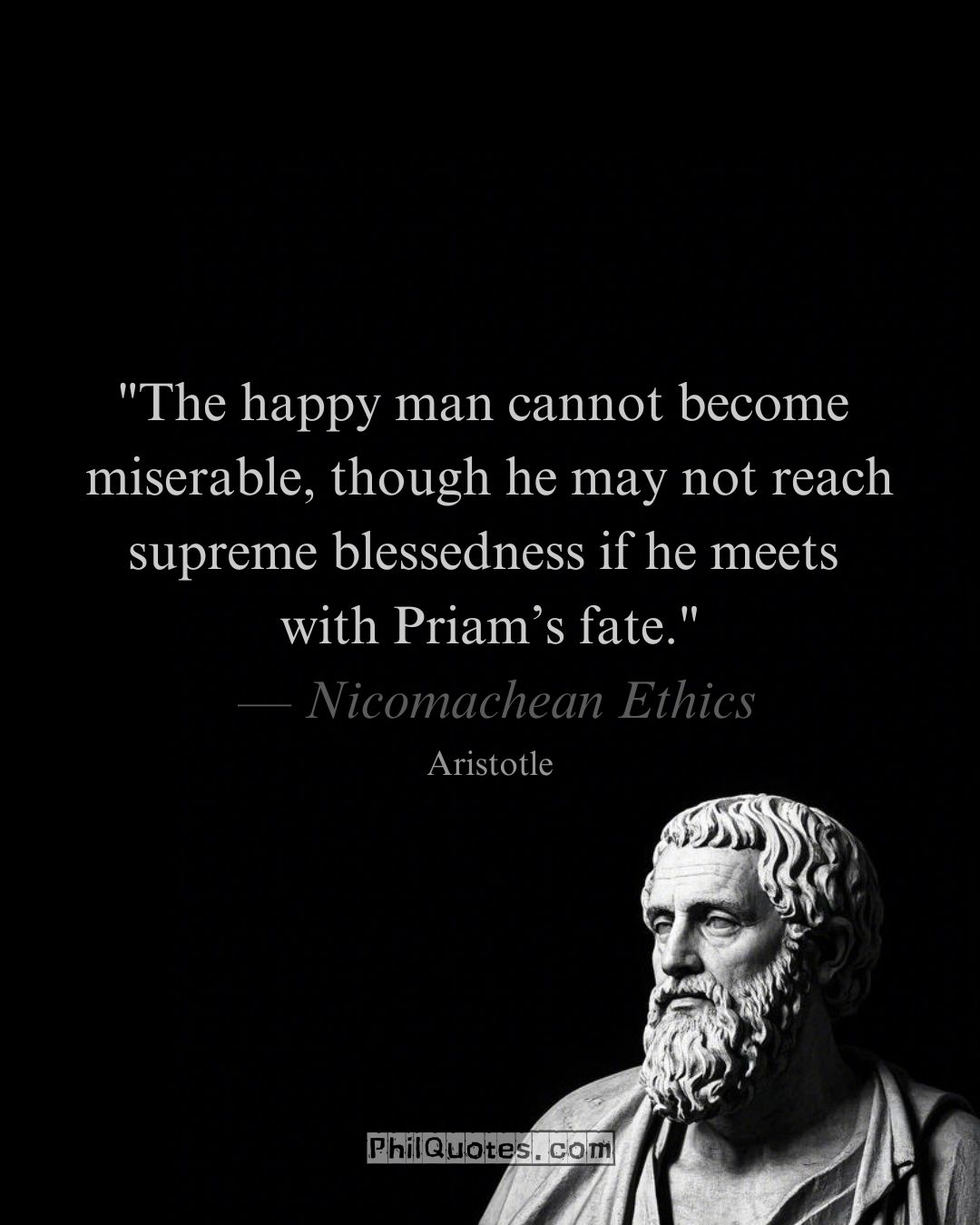
- “The happy man cannot become miserable, though he may not reach supreme blessedness if he meets with Priam’s fate.”
— Aristotle, Nicomachean Ethics, Book I, Chapter 10
(Translated by W.D. Ross)
- “The dead are affected by the fortunes of their descendants, but not in a way to change their happiness.”
— Aristotle, Nicomachean Ethics, Book I, Chapter 11
(Translated by W.D. Ross)
- “Happiness is a thing reverenced and perfect; it is the starting-point and cause of all good.”
— Aristotle, Nicomachean Ethics, Book I, Chapter 12
(Translated by W.D. Ross)
- “The soul has two parts, one rational and the other irrational.”
— Aristotle, Nicomachean Ethics, Book I, Chapter 13
(Translated by W.D. Ross)
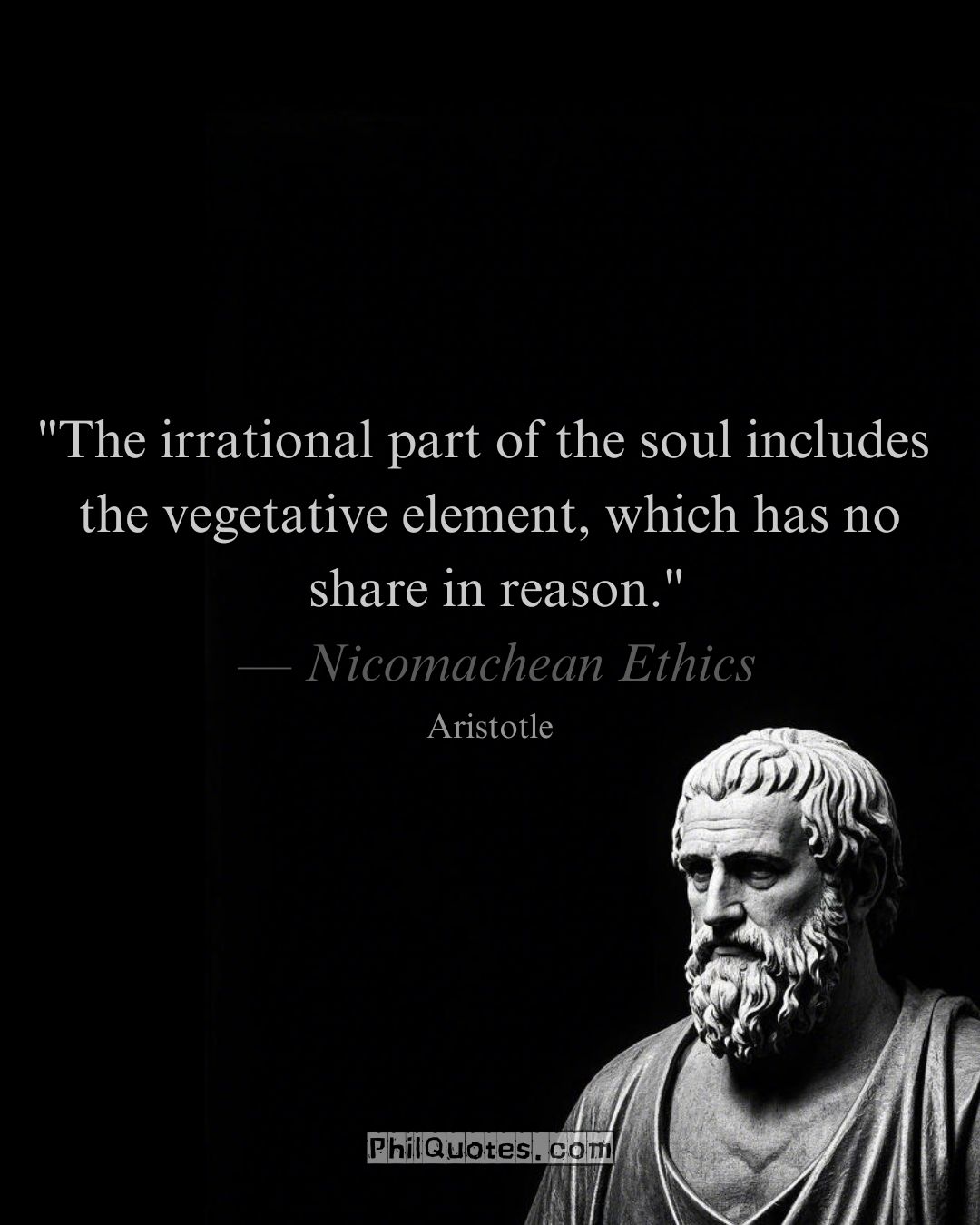
- “The irrational part of the soul includes the vegetative element, which has no share in reason.”
— Aristotle, Nicomachean Ethics, Book I, Chapter 13
(Translated by W.D. Ross)
- “The appetitive element in the soul may obey reason, as a child obeys a parent.”
— Aristotle, Nicomachean Ethics, Book I, Chapter 13
(Translated by W.D. Ross)
- “Virtue is divided into intellectual and moral: wisdom and prudence are intellectual; liberality and temperance are moral.”
— Aristotle, Nicomachean Ethics, Book I, Chapter 13
(Translated by W.D. Ross)
- “Moral virtue is formed by habit; none of the moral virtues arise in us by nature.”
— Aristotle, Nicomachean Ethics, Book I, Chapter 13
(Translated by W.D. Ross)
- “The virtue of man is the state of character which makes him a good man and capable of noble deeds.”
— Aristotle, Nicomachean Ethics, Book I, Chapter 13
(Translated by W.D. Ross)
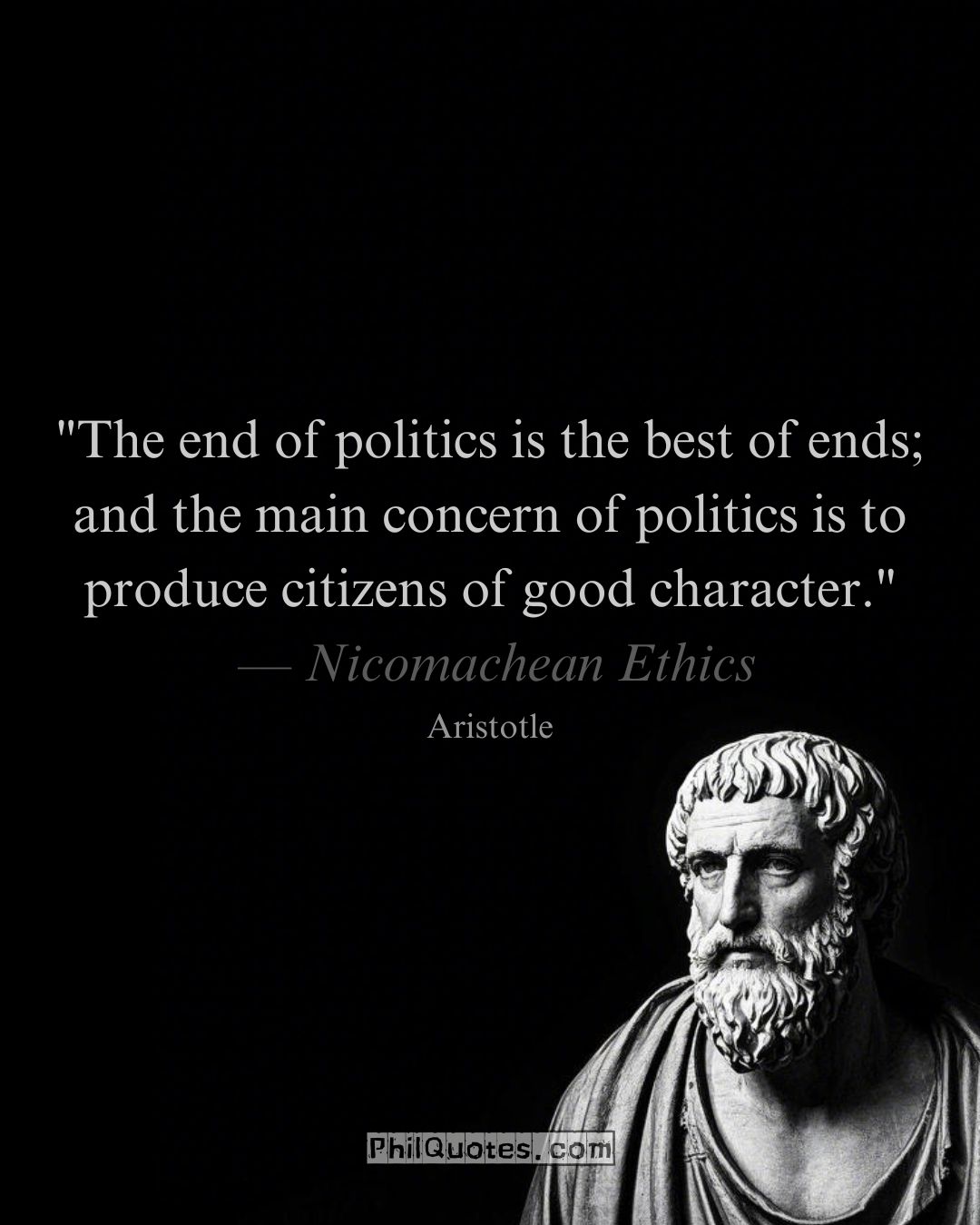
- “The end of politics is the best of ends; and the main concern of politics is to produce citizens of good character.”
— Aristotle, Nicomachean Ethics, Book I, Chapter 2
(Translated by W.D. Ross)
- “To be happy, a man must both act excellently and be furnished with external goods.”
— Aristotle, Nicomachean Ethics, Book I, Chapter 8
(Translated by W.D. Ross)
- “The life of contemplation is higher than the political life, for it is more self-sufficient.”
— Aristotle, Nicomachean Ethics, Book I, Chapter 5
(Translated by W.D. Ross)
- “The good man’s life is pleasant in itself, for pleasure is a natural accompaniment of noble acts.”
— Aristotle, Nicomachean Ethics, Book I, Chapter 8
(Translated by W.D. Ross)
- “The happy man is one whose activities accord with complete virtue, supplied with external goods for a complete life.”
— Aristotle, Nicomachean Ethics, Book I, Chapter 10
(Translated by W.D. Ross)
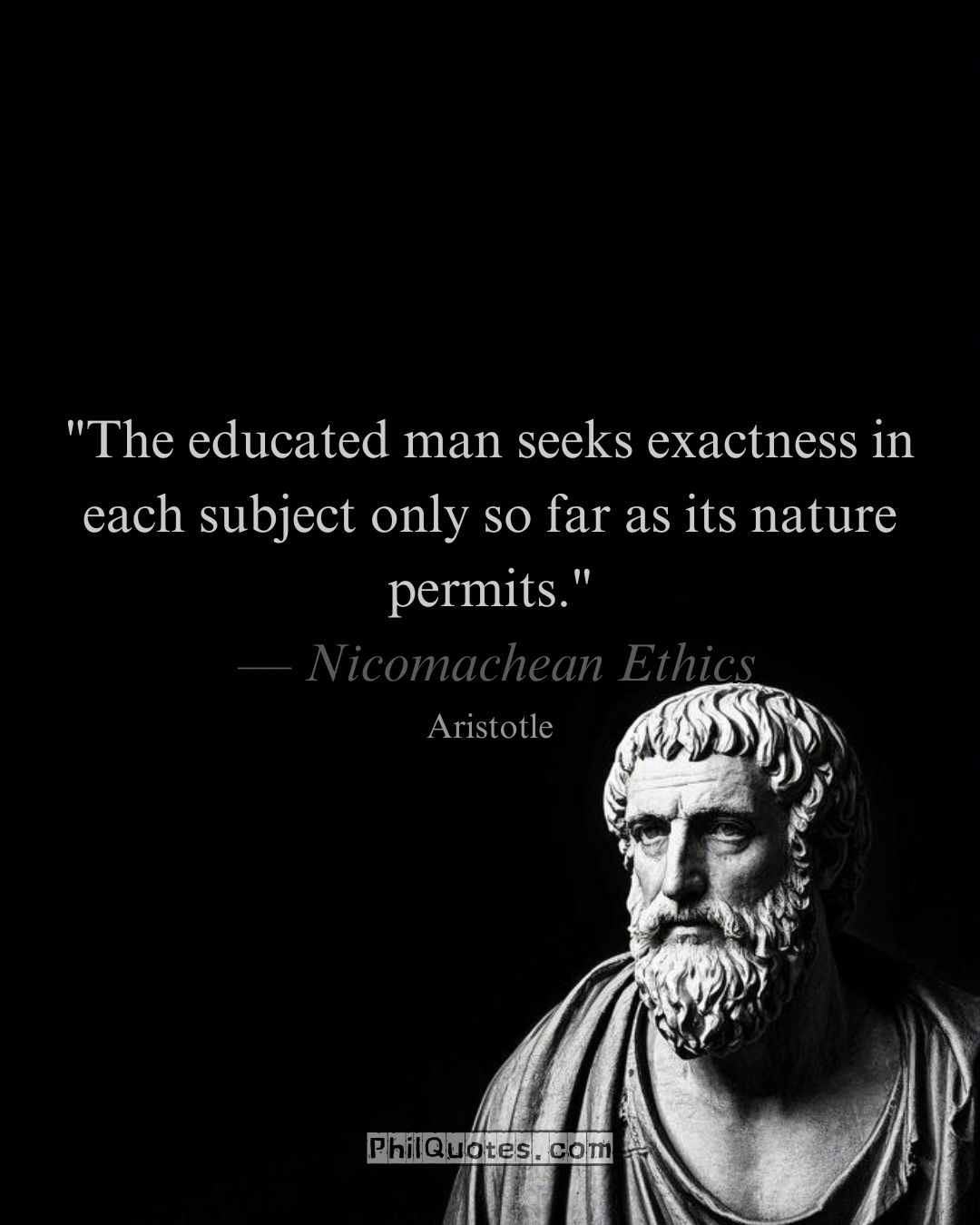
- “The educated man seeks exactness in each subject only so far as its nature permits.”
— Aristotle, Nicomachean Ethics, Book I, Chapter 3
(Translated by W.D. Ross)
- “Youth is not fit to study politics, for the young are led by their passions.”
— Aristotle, Nicomachean Ethics, Book I, Chapter 3
(Translated by W.D. Ross)
- “Virtue requires both natural capacity and deliberate practice.”
— Aristotle, Nicomachean Ethics, Book I, Chapter 13
(Translated by W.D. Ross)
- “The end of medicine is health; of shipbuilding, a vessel; of strategy, victory.”
— Aristotle, Nicomachean Ethics, Book I, Chapter 1
(Translated by W.D. Ross)
- “Happiness is activity in accordance with virtue, and this activity is its own reward.”
— Aristotle, Nicomachean Ethics, Book I, Chapter 7
(Translated by W.D. Ross)
Aristotle’s assertion that happiness is “the activity of the soul in accordance with virtue” remains a beacon for ethical living. Through these 50 quotes from Nicomachean Ethics, Book I, PhilQuotes.com illuminates how his ideas on character, politics, and purpose still resonate today. Dive deeper into each quote’s analysis by exploring the linked articles, and join PhilQuotes.com in redefining what it means to live a life of excellence. As Aristotle reminds us, the pursuit of wisdom begins with a single step—let this collection be yours.